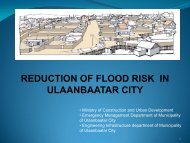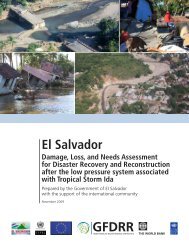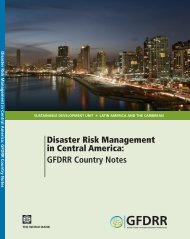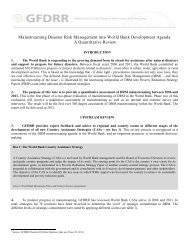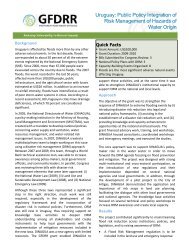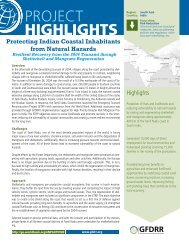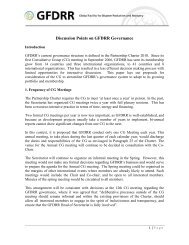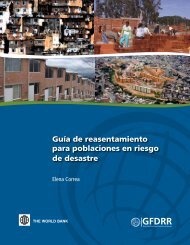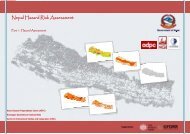Preventive Resettlement of Populations at Risk of Disaster - GFDRR
Preventive Resettlement of Populations at Risk of Disaster - GFDRR
Preventive Resettlement of Populations at Risk of Disaster - GFDRR
Create successful ePaper yourself
Turn your PDF publications into a flip-book with our unique Google optimized e-Paper software.
th<strong>at</strong> have occurred in th<strong>at</strong> place from ancestral times.<br />
(CONRED, 2006)<br />
The name Panabaj indic<strong>at</strong>es the ancestral inhabitants<br />
were well aware <strong>of</strong> the risks it presented.<br />
The name <strong>of</strong> the Tz’anchaj district derives from the<br />
words T´zan´, which is transl<strong>at</strong>ed as the tip (or end) and<br />
chaj, or pine tree. Together, these words are construed<br />
to mean “<strong>at</strong> the end <strong>of</strong> the village there are many pine<br />
trees,” suggesting th<strong>at</strong> the name <strong>of</strong> the district derives<br />
from the forest <strong>of</strong> pine trees and other trees th<strong>at</strong> once<br />
abounded in th<strong>at</strong> area. (CONRED, 2006)<br />
The 2006 CONRED study stresses the importance to<br />
the indigenous people <strong>of</strong> their spiritual guides (aj´kij),<br />
whom they highly respect and credit with knowing the<br />
cosmogony and spiritual heritage <strong>of</strong> the Tz´utujil people.<br />
They are also considered intermediaries between<br />
n<strong>at</strong>ure and the spiritual and human worlds.<br />
Among the most important spiritual fe<strong>at</strong>ures are the<br />
institution <strong>of</strong> the Rilajmam (the Old Grandf<strong>at</strong>her), the<br />
guild system, and the powers ascribed to ceremonial<br />
places, such as Lake Atitlán, volcanoes and the hills surrounding<br />
the municipality.<br />
The extended family is p<strong>at</strong>rilineal or male-domin<strong>at</strong>ed,<br />
especially with regard to domestic economic decisions.<br />
Another distinguishing fe<strong>at</strong>ure is th<strong>at</strong> grandparents,<br />
adult children and grandchildren usually live together<br />
in the same house, which cre<strong>at</strong>es gre<strong>at</strong>er integr<strong>at</strong>ion<br />
among family members and guarantees continuity in<br />
cultural p<strong>at</strong>terns.<br />
Previous disasters in the region<br />
The 2006 CONRED study also mentions th<strong>at</strong> the Panabaj<br />
and Tz’anchaj districts have experienced disasters<br />
throughout time. Historical references, hydrometeorological<br />
analyses, studies <strong>of</strong> str<strong>at</strong>igraphic pr<strong>of</strong>iles and interviews<br />
with the elderly in the districts and municipality<br />
<strong>of</strong> Santiago Atitlán confirm <strong>at</strong> least three disasters <strong>of</strong><br />
a similar n<strong>at</strong>ure in the past 100 years, all associ<strong>at</strong>ed with<br />
heavy rainy seasons accompanied by storms and hurricanes<br />
and always in October or the first half <strong>of</strong> November.<br />
The first, though not well identified disaster, was<br />
between 1910 and 1920, the second was in 1949, and<br />
the worst <strong>of</strong> the three was in the mid-twentieth century,<br />
which caused an avalanche and a series <strong>of</strong> landslides.<br />
In addition to n<strong>at</strong>ural disasters, the region experienced<br />
an extended period armed conflict in which clashes <strong>of</strong>ten<br />
affected the civilian popul<strong>at</strong>ion more severely than<br />
the comb<strong>at</strong>ants. Indeed, the popul<strong>at</strong>ion was harassed<br />
both by the military and armed insurgents.<br />
Following the murder <strong>of</strong> 13 people in Santiago Atitlán in<br />
December 1990 by soldiers assigned to the military outpost<br />
in the Panabaj district, the popul<strong>at</strong>ion petitioned<br />
the Government to immedi<strong>at</strong>ely withdraw the troops,<br />
which it did. The local popul<strong>at</strong>ion still remembers the<br />
event and their rejection <strong>of</strong> the security forces. As a result,<br />
th<strong>at</strong> distrust <strong>of</strong> the military and the Government is<br />
rekindled even in humanitarian crises, such as n<strong>at</strong>ural<br />
disasters.<br />
Chapter 6 The First Tz´utujil City <strong>of</strong> the Twenty-First Century | Gu<strong>at</strong>emala |<br />
93



